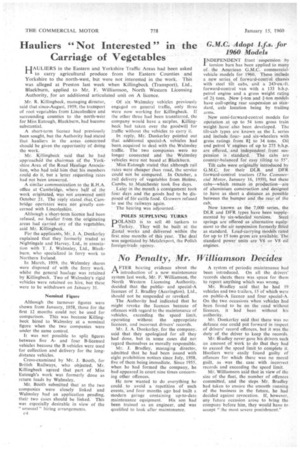No Penalty, lir. Williamson Decides
Page 42

If you've noticed an error in this article please click here to report it so we can fix it.
A FTER hearing evidence about the
introduction of new maintenance system last week, Mr. F. Williamson, the North Western Licensing Authority, decided that the publicand sPecial-A licences of J. Bradley (Accrington), Ltd., should not be suspended or revoked.
The Authority had indicated that he might revoke the licences because of offences with regard to the maintenance of vehicles, exceeding the speed limit,operating without the appropriate licences, and incorrect drivers' records.
Mr. J. A. Dunkerley, for the company, said that they apologized for all they had • done, but in some cases did not regard themselves as morally responsible. " Mr. J. Bradley, managing director, admitted that he had been issued with eight prohibition notices since July, 1958, five of them being immediate. Since 1955, when he had formed the company, he had appeared in court nine times concerning other offences.
He now wanted to do everything he could to avoid a repetition Of such events, -and four months ago had built a modern garage containing up-to-date maintenance equipment His son had been trained as an engineer, and was qualified to look after maintenance,
A system of periodic maintenance had been introduced. On all the, drivers' records sheets there was space for them to report anything which was wrong.
Mr. Bradley said that he had 19 vehicles and two trailers, 15 of which were on public-A licence and four special-A. On the two occasions when vehicles had been found to be on the road without licences, it had been without his authority.
Mr. Dunkerley said that there was no defence one could put forward in respect. of drivers' record offences, but it was the duty of the driver to keep the 'records.
Mr. liradley never gave his drivers such an amount of.work to do that they had to exceed the speed limit to complete it. Hauliers were easily found guilty of offences forwhich there was no moral guilt, as . was the. case with. incorrect records and exceeding the speed limit.
Mr. Williamson said that in view of the size of the fleet, the number of offences committed, and the steps Mr. Bradley bad taken to ensure the smooth running of the business in the future, he had decided against revocation. If, however, any future occasion arose to bring the company before him, they would have to accept " the most severe punishment."












































































































